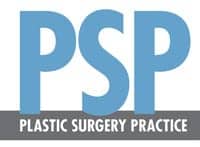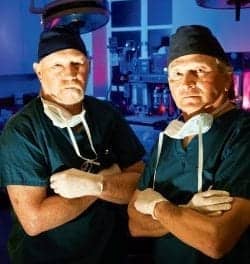Plastic Surgery Practice July 2014
By Denise Mann, Editor
After a few days of complaining about a sore throat to anyone who would listen (mainly, my husband, David), he convinced me to see his internist instead of mine largely because he loves his doctor, the office is on our block, and the doctor is on our insurance plan. I went kicking and screaming largely because I was convinced that the sore throat was actually a rare, but aggressive type of cancer and knew I could not face the devastating diagnosis. Turns out, it was postnasal drip, but that’s neither here nor there. The real point of this editor’s message is what I learned from this visit and how it can help readers.
Dr Arthur Heller did everything right. He came out to the waiting room to greet me, shook my hand, and escorted me back to his office. We sat there for close to 30 minutes discussing everything and anything from my family and personal history, diet and penchant for Pinot Grigio, to my activity level and current symptoms. Dr Heller had a laptop, but was careful to make eye contact during the conversation.
It was hard for me, being an impatient, neurotic New Yorker, not to hit “fast forward” and beg him to examine me and tell me my fate, but I was a patient patient. The examination was equally thorough. He checked my reflexes (who does that in 2014 on a sick visit?), and even noticed a white nick on one of my nails that was likely due to trauma. Impressive.
After the exam, we went back into his office and discussed postnasal drip, and developed an action plan about how to treat it. He walked me out, shook my hand, and actually took my copay and gave me a receipt. This type of service is almost unheard of today in any city and in any specialty. Everything is computerized, and the physician is often the Wizard of Oz, meaning you don’t see him or her until you go down a yellow brick road filled with physician assistants, residents, insurance coordinators, nurses, and the like.
I advocate for a return to the days of yore, when doctors examined patients and listened to their concerns. The personal touch can go such a long way. Failure to connect and be present with patients is one of the main reason that consultations don’t become surgeries and that current patients don’t become repeat patients.
This is not the only missed opportunity I have noticed of late. I spend much time editing pieces about online reputation management and equal amounts sitting in practice-management seminars listening to doctors tell their tales of woe.
The best way to address negative reviews is to prevent them from being posted in the first place. Is this always possible? No, but there are times that it is. At a recent Manhattan mom’s dinner party, a guest was complaining about a plastic surgeon who was not letting her apply the cost of a prepaid treatment package to a more palatable treatment. She was upset, and someone suggested writing an online review. I knew the physician, and suggested that perhaps the woman should ask the doctor again. I also called the doctor and told her how I thought she could turn this around.
I do not know what happened. I can only hope that the doctor took my advice and this woman is now satisfied. You don’t need to be a fly on the wall at a dinner party to know which patients aren’t happy. While some may have unreasonable demands or requests, others just want to be treated fairly. Identify these patients, acknowledge their concerns, and meet them halfway where you can. Getting to know your patients is never a missed opportunity.
Original citation for this article: Mann D. Missed opportunities. Plastic Surgery Practice. 2014;(7),6.



